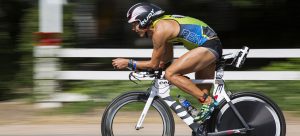By: Sansego Coach- Matt Smith, Nutritional Therapy Practitioner
Have you ever felt bloated or like you’re going to throw up on the run course of your IRONMAN race? Have you had perfect training sessions, but on race day, totally hit a wall and couldn’t figure out why? Maybe you even made a few extra trips to the Porta-Potty on race morning?
In 10 years of seeing countless athletes complain of GI issues, bonking or cramping, the question I kept asking was, “What if it’s not the fuel but the fuel system that’s broken?” This lead me to explore Nutritional Therapy, which provides more of a long-term health and healing perspective. I’m now convinced that if athletes focus on the fuel system vs. just the fuel, you will see significant differences in on-course race performance.

Here are 5 key factors that play into fuel system efficiency and I’ll give you a few tips to get started as you focus on each:
Properly Prepared, Nutrient Dense, Whole Foods Based Diet
- Macro ratios of 40% carbs, 30% fat, 30% protein
- Know where your food comes from. Buy from the farm, farmers market or organic from the store.
- Choose real foods over processed foods (shop the outside of the store).
- If you cook with it, you consume it. Think about your cookware and use wood or stainless steel vs. Teflon or plastic.
Hydration Delivers What Your Body Needs
- Consume 60-100 oz of water daily.
- Filtered water is better than tap water, so try a reverse osmosis filter for your home.
- If you drink a diuretic like coffee, double the amount in water.
- Add electrolytes to your water in the form of sea salt or pink Himalayan salt. Just a touch is all you need.
Digestion is Your Fuel System, Make Sure It’s Delivering Fuel to the Engine
- Digestion happens in a relaxed or parasympathetic state, so take a moment before you eat to appreciate the food and chew slow.
- Fermented foods, such as pickles, sauerkraut and Kombucha, help digestion.
- Foods such as beets and leafy greens help bile production to break down fats and proteins.
- Antacids or Tums can hurt digestion more than help.
- You have over 1 million micro-organisms in your small intestine; keep the good ones in by using probiotic or cultured foods.
Fats are Your Friend
- Healthy fats speed recovery and can be used as energy.
- Eat your egg yolks for good cholesterol, helping to produce DHEA that yields testosterone and cortisol.
- Nuts, seeds, avocado, coconut oil, animal fats like grass fed butter are good.
- The walls of the cells in your body are formed by fat so it will help with recovery.
- Collagen is great for tendon and muscle repair; try a bone broth or collagen peptides powder.
Balance Your Minerals for Optimal Muscle and Metabolic Function
- Make sure you are eating foods rich in vitamins A, C and B for metabolic reactions that help muscles contract.
- Try a mineral broth for a recovery drink (check out Shalane Flanagan’s cookbook).
- Get some sun for the best Vitamin D; train outside!
These are simple tips that will help you get on track for the best performance on race day by having your fuel system operating at 100%. If you go into race day with the system running smoothly, I can guarantee you will feel better and race faster! If you have questions, please feel free to contact me directly at matt.smith@sansego.co or check out Nutritional Therapy Association for more information.
MORE ON THE HOTSHOT BLOG
Run Fast, Eat Slow: Marathoner and cookbook author Shalane Flanagan’s top nutrition tips.
6 Superfoods for Runners: What all endurance athletes should be eating.
HOTSHOT Science: Let’s talk science: Our team shares information about TRP Channels and why they are impacting muscle cramps.
5 Ways Exercise Impacts your Brain: You’re working more than just your muscles.

